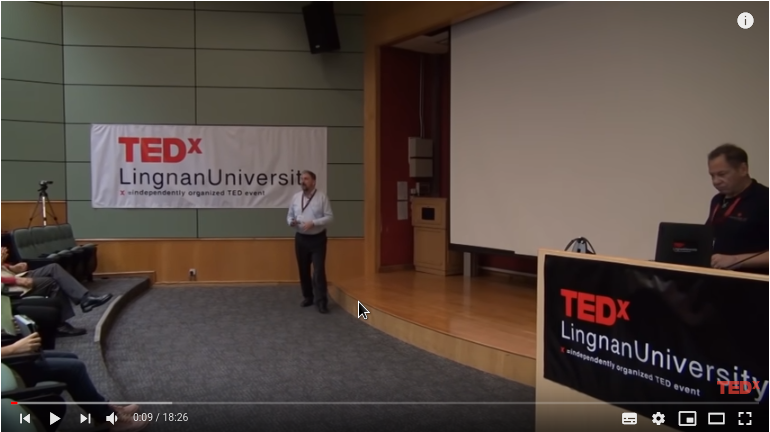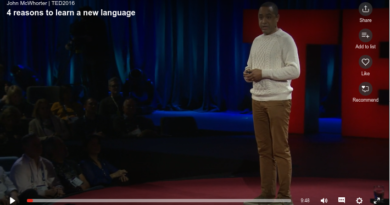Vídeo | How to learn any language in six months
Palestra proferida por Chris Londale, no TEDxLingnanUniversity. Nesta palestra ele explica sua metodologia para aprender qualquer idioma em 6 meses. O vídeo já foi assistido 17.669.537 (dados de 11 de agosto de 2019) e é extremamente rico em informações úteis para aprendizes de qualquer idioma.
Sua metodologia consiste de cinco princípios:
- Focar no conteúdo do idioma que seja relevante para você;
- Use o idioma como uma ferramenta para se comunicar desde o primeiro dia;
- Ao entender a mensagem você terá adquirido a língua inconscientemente, ou seja, um input compreensível (Krashen, et al)
- Um idioma não é a acumulação de uma grande quantidade de conhecimento, mas um tipo de treinamento fisiológico;
- O estado psico-fisiológico é importante – você precisa estar feliz, relaxado, e mais importante, ser tolerante à ambiguidade. Não tente entender cada detalhe pois isto lhe enlouquecerá.
As 7 Ações:
- Ouça o idioma o máximo que puder – não interessa se você entende ou não. Ouça os ritmos e os padrões;
- Foque no significado primeiro, antes das palavras. A linguagem corporal e as expressões faciais podem ajudar.
- Combine os elementos do idioma, seja criativo e use o que você estiver aprendendo;
- Foque no núcleo do idioma – as palavras mais comuns, e use o idioma para aprender mais (What is this/that? How do you say? etc.)
- Obtenha um parceiro no idioma – alguém que seja fluente no idioma e que se esforçará para entender você; que não corrigirá os seus erros; que lhe dará um feedback de seu entendimento do que você estiver falando e usará palavras que você conhece;
- Copie o rosto – observe o rosto dos nativos do idioma, com atenção particular para a forma como sua boca se move quando estão falando;
- Estabeleça contato direto com o idioma – descubra maneiras de conectar as palavras diretamente com as imagens e outras representações internas.
Clique aqui para fazer o download do áudio desta palestra.
| English Transcript | Portuguese Translation |
|---|---|
| Translator: TED Translators admin Reviewer: Allam Zedan | Tradutor: Bruno Rodrigues Revisor: Maurício Kakuei Tanaka |
| The people in the back, can you hear me clearly? | O pessoal do fundo consegue me ouvir bem? |
| OK, good. | Ótimo. |
| Have you ever held a question in mind for so long that it becomes part of how you think? | Vocês já tiveram uma pergunta na cabeça por tanto tempo a ponto de ela se tornar parte de como você pensa? |
| Maybe even part of who you are as a persona? | Talvez até mesmo parte de quem você é como pessoa? |
| Well I've had a question in my mind for many, many years and that is: How can you speed up learning? | Tive uma pergunta dessas por muitos anos: "Como é possível acelerar o aprendizado?" |
| Now, this is an interesting question because if you speed up learning, you can spend less time at school. | É uma pergunta interessante, pois, acelerando o aprendizado, você pode gastar menos tempo na escola. |
| And if you learn really fast, you probably wouldn't have to go to school at all. | Se aprender realmente rápido, talvez nem precise ir à escola. |
| Now, when I was young, school was sort of OK but... I found quite often that school got in the way of learning so I had this question in mind: How do you learn faster? | Quando eu era jovem, achava a escola normal, mas... aprendi que, muitas vezes, ela atrapalha o aprendizado. Fiquei com esta pergunta na cabeça: "Como se aprende mais rápido?" |
| And this began when I was very, very young, when I was 11 years old, I wrote a letter to researchers in the Soviet Union, asking about hypnopaedia, this is sleep-learning, where you get a tape recorder, you put it beside your bed and it turns on in the middle of the night when you're sleeping, and you're supposed to be learning from this. | Isso começou quando eu era bem jovem, aos 11 anos, escrevi uma carta a pesquisadores da URSS perguntando sobre a hipnopedia, que significa aprender dormindo. Você põe um toca-fitas ao lado da cama, e ele liga no meio da noite, quando você está dormindo, e espera-se que você aprenda dessa forma. |
| A good idea, unfortunately it doesn't work. | É uma boa ideia, mas infelizmente não funciona. |
| But, hypnopaedia did open the doors to research in other areas and we've had incredible discoveries about learning that began with that first question. | Porém, a hipnopedia abriu as portas para pesquisas em outras áreas, e tivemos descobertas incríveis sobre o aprendizado que começaram com essa primeira pergunta. |
| I went on from there to become passionate about psychology and I have been involved in psychology in many different ways for the rest of my life up until this point. | Parti desse ponto e me apaixonei pela psicologia, com a qual estive envolvido de muitas maneiras diferentes por toda a minha vida, até hoje. |
| In 1981, I took myself to China and I decided that I was going to be native level in Chinese inside two years. | Em 1981, fui à China e decidi que falaria chinês como um nativo em dois anos. |
| Now, you need to understand that in 1981, everybody thought Chinese was really, really difficult and that a Westerner could study for 10 years or more and never really get very good at it. | Vocês precisam entender que, em 1981, todos achavam que chinês era muito difícil, e que um ocidental poderia estudar por dez anos ou mais e nunca conseguiria falar bem esse idioma. |
| And I also went in with a different idea which was: taking all of the conclusions from psychological research up to that point and applying them to the learning process. | Também fui com uma ideia diferente: pegar todas as conclusões das pesquisas psicológicas naquele momento e aplicá-las ao processo de aprendizagem. |
| What was really cool was that in six months I was fluent in Mandarin Chinese and it took a little bit longer to get up to native. | O mais legal é que, em seis meses, eu estava fluente em chinês mandarim, e levei apenas mais um tempo para chegar ao nível de um nativo. |
| But I looked around and I saw all of these people from different countries struggling terribly with Chinese, I saw Chinese people struggling terribly to learn English and other languages, and so my question got refined down to: How can you help a normal adult learn a new language quickly, easily and effectively? | Mas eu olhava ao redor e via todas essas pessoas de países diferentes com dificuldades enormes para aprender chinês. Eu via chineses se esforçando para aprender inglês e outros idiomas. Então, minha pergunta se aprimorou para: "Como ajudar um adulto normal a aprender um novo idioma de forma rápida, fácil e eficaz?" |
| Now this is a really, really important question in today's world. | Essa é uma pergunta muito importante no mundo de hoje. |
| We have massive challenges with environment, we have massive challenges with social dislocation, with wars, all sorts of things going on and if we can't communicate, we're really going to have difficulty solving these problems. | Temos grandes desafios com o meio ambiente, com deslocamentos sociais, com guerras, com tudo o que está acontecendo e, se não pudermos nos comunicar, teremos grandes dificuldades para resolver esses problemas. |
| So we need to be able to speak each other's languages, this is really, really important. | Precisamos conseguir falar o idioma do outro. Isso é realmente muito importante. |
| The question then is: How do you do that? Well, it's actually really easy. | A pergunta, então, é: "Como se faz isso?" Na verdade, é muito fácil. |
| You look around for people who can already do it, you look for situations where it's already working and then you identify the principles and apply them. | Você procura pessoas que já fazem isso, procura situações em que isso funciona e, então, identifica princípios e os aplica. |
| It's called modelling and I've been looking at language learning and modelling language learning for about 15 to 20 years now. | Chama-se modelagem, e venho pesquisando aprendizado de idiomas e seu processo de modelagem há cerca de 15 a 20 anos. |
| And my conclusion, my observation from this is that any adult can learn a second language to fluency inside six months. | Minha conclusão, minha observação a partir disso é: qualquer adulto pode aprender e ser fluente em um segundo idioma em seis meses. |
| Now when I say this, most people think I'm crazy, this is not possible. | Quando digo isso, a maioria das pessoas pensa que sou louco, que é impossível. |
| So let me remind everybody of the history of human progress, it's all about expanding our limits. | Deixem-me lembrar a todos de que a história do progresso humano se trata de expandir nossos limites. |
| In 1950, everybody believed that running one mile in four minutes was impossible, and then Roger Bannister did it in 1956 and from there it's got shorter and shorter. | Em 1950, todos acreditavam que correr 1,6 km em 4 minutos era impossível. Roger Bannister fez isso em 1956 e, desde então, fomos conseguindo cada vez mais. |
| 100 years ago everybody believed that heavy stuff doesn't fly. | Há 100 anos, todos acreditavam que coisas pesadas não voavam. |
| Except it does and we all know this. | Mas voam, e todos sabemos disso. |
| How does heavy stuff fly? We reorganise the material using principles that we have learned from observing nature, birds in this case. | Como coisas pesadas voam? Reorganizamos a matéria usando princípios que aprendemos da observação da natureza, aves, nesse caso. |
| And today we've gone even further... | Hoje estamos indo ainda mais longe... |
| We've gone even further, so you can fly a car. | Estamos indo ainda mais longe. Podemos fazer um carro voar. |
| You can buy one of these for a couple 100.000 US dollars. | Você pode comprar um desses por cerca de US$ 100 mil. |
| We now have cars in the world that fly. | Agora temos carros que voam. |
| And there's a different way to fly which we've learned from squirrels. | E há outra forma diferente de voar, que aprendemos com os esquilos. |
| So all you need to do is copy what a flying squirrel does, build a suit called a wing suit and off you go, you can fly like a squirrel. | Tudo o que precisa fazer é copiar o que o esquilo voador faz, construir uma roupa chamada traje planador e pronto: você pode voar como um esquilo. |
| Now most people, a lot of people, I wouldn't say everybody but a lot of people think they can't draw. | A maioria das pessoas, eu não diria todas, mas muitas delas acham que não sabem desenhar. |
| However there are some key principles, five principles, that you can apply to learning to draw and you can actually learn to draw in five days. | No entanto, há cinco princípios fundamentais, que você pode aplicar para aprender a desenhar em cinco dias. |
| So, if you draw like this, you learn these principles for five days and apply them and after five days you can draw something like this. | Se você desenha assim, aprende e aplica esses princípios por cinco dias, e, após esse período, poderá desenhar algo assim. |
| Now I know this is true because that was my first drawing and after five days of applying these principles that was what I was able to do. | Sei que isso é verdade porque este foi meu primeiro desenho e, após cinco dias aplicando esses princípios, consegui desenhar isto. |
| And I looked at this and I went: "Wow, so that's how I look like when I'm concentrating so intensely that my brain is exploding." | Olhei pra isso e pensei: "Uau! É disso que sou capaz quando me concentro tanto a ponto de o cérebro explodir". |
| So, anybody can learn to draw in five days and in the same way, with the same logic, anybody can learn a second language in six months. | Qualquer pessoa pode aprender a desenhar em cinco dias e, da mesma forma, com a mesma lógica, qualquer um consegue aprender um segundo idioma em seis meses. |
| How? There are five principles and seven actions. | Como? Há cinco princípios e sete ações. |
| There may be a few more but these are absolutely core. | Talvez existam outros, mas esses são os principais. |
| And before I get into those I just want to talk about two myths, I want to dispel two myths. | Antes de chegarmos a eles, quero falar sobre dois mitos. Quero desmenti-los. |
| The first is that you need talent. | O primeiro é o mito do talento. |
| Let me tell you about Zoe. | Deixem-me falar sobre Zoe. |
| Zoe came from Australia, went to Holland, was trying to learn Dutch, struggling extremely, extremely... a great deal | Zoe veio da Austrália; foi à Holanda; estava tentando aprender alemão; esforçando-se bastante... muito mesmo. |
| and finally people were saying: "You're completely useless," "you're not talented," "give up," "you're a waste of time" and she was very, very depressed. | As pessoas diziam: "Você é totalmente inútil", "não tem talento", "desista", "está perdendo tempo", e ela ficou muito deprimida. |
| And then she came across these five principles, she moved to Brazil and she applied them and in six months she was fluent in Portuguese, so talent doesn't matter. | Ela se deparou com esses cinco princípios, mudou-se para o Brasil e os aplicou. Em seis meses, era fluente no português, ou seja, o talento não importa. |
| People also think that immersion in a new country is the way to learn a language. | As pessoas também acham que, pela imersão num país novo, aprenderão um novo idioma. |
| But look around Hong Kong, look at all the westerners who've been here for 10 years, who don't speak a word of Chinese. | Olhe para Hong Kong e todos os ocidentais que estão aqui há cerca de dez anos e não falam uma palavra em chinês. |
| Look at all the Chinese living in America, Britain, Australia, Canada have been there 10, 20 years and they don't speak any English. | Veja todos os chineses que moram nos EUA, na Inglaterra, na Austrália, no Canadá, há 10, 20 anos, e não falam nada em inglês. |
| Immersion per se does not work. | A imersão por si só não funciona. |
| Why? Because a drowning man cannot learn to swim. | Por quê? Porque um homem se afogando não consegue aprender a nadar. |
| When you don't speak a language, you're like a baby. | Se você não fala um idioma, é como um bebê. |
| And if you drop yourself into a context which is all adults talking about stuff over your head, you won't learn. | Se você se coloca em um contexto no qual um adulto fala coisas que não entende, você não irá aprender. |
| So, what are the five principles that you need to pay attention to? | Quais são os cinco princípios que você precisa prestar atenção? |
| First: the four words, attention, meaning, relevance and memory, and these interconnect in very, very important ways. Especially when you're talking about learning. | Primeiro, as quatro palavras: atenção, significado, relevância e memória, que se interconectam de várias formas importantes, ainda mais quando se trata de aprender. |
| Come with me on a journey through a forest. | Acompanhem-me em uma jornada pela floresta. |
| You go on a walk through a forest and you see something like this... Little marks on a tree, maybe you pay attention, maybe you don't. | Você caminha por ela e vê algo parecido com isto: pequenas marcas em uma árvore. Talvez você preste atenção, talvez não. |
| You go another 50 metres and you see this... | Caminha outros 50 metros e vê isto. |
| You should be paying attention. | Você deveria estar prestando atenção. |
| Another 50 metres, if you haven't been paying attention, you see this... | Mais 50 metros, se não estiver prestando atenção, você vê isto. |
| And at this point, you're paying attention. | A partir de agora, você presta atenção. |
| And you've just learned that this... is important, it's relevant because it means this, and anything that is related, any information related to your survival is stuff that you're going to pay attention to and therefore you're going to remember it. | Você acabou de aprender que isso é importante e relevante, porque significa sobrevivência, e qualquer informação relacionada a ela é algo no qual prestará atenção e do qual se lembrará. |
| If it's related to your personal goals, then you're going to pay attention to it. | Se estiver relacionado com seus objetivos pessoais, você irá prestar atenção. |
| If it's relevant, you're going to remember it. | Se for relevante, você irá se lembrar. |
| So, the first rule, first principle for learning a language is focus on language content that is relevant to you. | O primeiro princípio para aprender um idioma é se concentrar no conteúdo que for relevante para você. |
| Which brings us to tools. | Isso nos leva às ferramentas. |
| We master tools by using tools and we learn tools the fastest when they are relevant to us. | Nós as dominamos pelo uso e aprendemos a usá-las mais rápido quando são relevantes para nós. |
| So let me share a story. | Vou contar uma história. |
| A keyboard is a tool. | Um teclado é uma ferramenta. |
| Typing Chinese a certain way, there are methods for this. That's a tool. | Há métodos para escrever em chinês, e esta ferramenta serve para isso. |
| I had a colleague many years ago who went to night school; Tuesday night, Thursday night, two hours each time, practicing at home, she spent nine months, and she did not learn to type Chinese. | Tive uma colega, há muitos anos, que ia à escola noturna às terças e quartas, duas horas por dia. Ela praticou em casa por nove meses e não aprendeu a escrever em chinês. |
| And one night we had a crisis. | Certa noite, tivemos uma crise. |
| We had 48 hours to deliver a training manual in Chinese. | Tínhamos 48 horas para entregar um manual de treinamento em chinês. |
| And she got the job, and I can guarantee you in 48 hours, she learned to type Chinese because it was relevant, it was meaningful, it was important, she was using a tool to create value. | Ela pegou o trabalho, e garanto a vocês que, em 48 horas, ela aprendeu a escrever em chinês, porque era relevante, significativo e importante, e ela estava usando a ferramenta para criar valor. |
| So the second principle for learning a language is to use your language as a tool to communicate right from day one. As a kid does. | O segundo princípio para aprender um idioma é usá-lo como uma ferramenta para se comunicar desde o primeiro dia, assim como uma criança faz. |
| When I first arrived in China, I didn't speak a word of Chinese, and on my second week, I got to take a train ride overnight. | Quando cheguei à China, eu não falava uma palavra em chinês. Em minha segunda semana, fui passear de trem à noite. |
| I spent eight hours sitting in the dining car talking to one of the guards on the train, he took an interest in me for some reason, and we just chatted all night in Chinese and he was drawing pictures and making movements with his hands and facial expressions and piece by piece by piece I understood more and more. | Passei oito horas no vagão-restaurante falando com um dos guardas do trem, que se interessou por mim por alguma razão, e conversamos a noite toda em chinês. Ele desenhava imagens, fazia movimentos com as mãos e expressões faciais e, pouco a pouco, eu entendia cada vez mais. |
| But what was really cool, was two weeks later, when people were talking Chinese around me, I was understanding some of this and I hadn't even made any effort to learn that. | Mas o mais legal foi que, duas semanas depois, quando pessoas falavam em chinês ao meu redor, eu entendia algumas coisas e não fiz esforço algum para aprender isso. |
| What had happened, I'd absorbed it that night on the train, which brings us to the third principle. When you first understand the message, then you will acquire the language unconsciously. | Absorvi isso naquela noite no trem, o que nos leva ao terceiro princípio: quando você entende primeiro a mensagem, aprende o idioma de forma inconsciente. |
| And this is really, really well documented now, it's something called comprehensible input. | Isso está muito bem documentado hoje, e chama-se "linguagem compreensiva". |
| There's 20 or 30 years of research on this, Stephen Krashen, a leader in the field, has published all sorts of these different studies and this is just from one of them. | Há cerca de 20 ou 30 anos de pesquisa nesse campo. Stephen Krashen, líder na área, publicou vários estudos diferentes, e esse é apenas um deles. |
| The purple bars show the scores on different tests for language. | As barras lilás mostram a pontuação em diferentes testes para idiomas. |
| The purple people were people who had learned by grammar and formal study, the green ones are the ones who learned by comprehensible input. | As pessoas em lilás aprenderam pela gramática e pelo estudo formal; aquelas em verde aprenderam pela linguagem compreensiva. |
| So, comprehension works. Comprehension is key and language learning is not about accumulating lots of knowledge. | A compreensão funciona; ela é a chave, e o aprendizado de um idioma não se trata de acumular muito conhecimento. |
| In many, many ways it's about physiological training. | De várias formas, trata-se de treinamento fisiológico. |
| A woman I know from Taiwan did great in English at school, she got A grades all the way through, went through college, A grades, went to the US and found she couldn't understand what people were saying. | Conheço uma mulher de Taiwan muito boa em inglês na escola, que sempre tirava boas notas. Entrou na faculdade com boas notas. Foi aos EUA e descobriu que não conseguia entender o que as pessoas falavam. |
| And people started asking her: "Are you deaf?" And she was. English deaf. | Elas começavam a perguntar: "Você é surda?" E ela era: surda para o inglês. |
| Because we have filters in our brain that filter in the sounds that we are familiar with and they filter out the sounds of languages that we're not. | Porque temos filtros no cérebro que filtram para dentro os sons a que estamos acostumados e, para fora, aqueles a que não estamos. |
| And if you can't hear it, you won't understand it, if you can't understand it, you're not going to learn it. | Se você não ouve esses sons, não os entenderá; se não os entender, não irá aprendê-los. |
| So you actually have to be able to hear these sounds. | Na verdade, você precisa conseguir escutar esses sons. |
| And there are ways to do that but it's physiological training. | Há formas para se fazer isso, mas é um treinamento fisiológico. |
| Speaking takes muscle. | Falar requer musculatura. |
| You've got 43 muscles in your face, you have to coordinate those in a way that you make sounds that other people will understand. | Você tem 43 músculos no rosto. Precisa coordená-los de uma forma que os leve a produzir os sons que outras pessoas irão entender. |
| If you've ever done a new sport for a couple of days, and you know how your body feels? Hurts? If your face is hurting, you're doing it right. | Se você já praticou um esporte novo por alguns dias, sabe como seu corpo fica? Ele dói? Se seu rosto doer, você está fazendo certo. |
| And the final principle is state. Psycho-physiological state. | O último princípio é seu estado psicofisiológico. |
| If you're sad, angry, worried, upset, you're not going to learn. Period. | Se você estiver triste, bravo, preocupado, chateado, não irá aprender, de modo algum. Ponto final. |
| If you're happy, relaxed, in an Alpha brain state, curious, you're going to learn really quickly, and very specifically you need to be tolerant of ambiguity. | Se estiver feliz, relaxado, em estado alfa do cérebro, curioso, aprenderá realmente rápido, e muito especificamente precisa ser tolerante com essa ambiguidade. |
| If you're one of those people who needs to understand 100 percent every word you're hearing, you will go nuts, because you'll be incredibly upset all the time, because you're not perfect. | Se você for uma pessoa que precisa entender 100% de cada palavra que escuta, irá enlouquecer, pois terá muita frustração o tempo todo por não atingir a perfeição. |
| If you're comfortable with getting some, not getting some, just paying attention to what you do understand, you're going to be fine, relaxed, and you'll be learning quickly. | Se você se sentir à vontade aprendendo aos poucos, só prestando atenção no que entende, irá ficar bem, relaxado, e aprender rapidamente. |
| So based on those five principles, what are the seven actions that you take? | Baseado nesses cinco princípios, quais são as sete ações necessárias? |
| Number one: Listen a lot. | Número um: escute muito. |
| I call it brain soaking. | Chamo isso de saturar o cérebro. |
| You put yourself in a context where you're hearing tons and tons and tons of a language and it doesn't matter if you understand it or not. | Você se coloca em um contexto em que escuta toneladas de um idioma, e não importa se entende ou não. |
| You're listening to the rhythms, to patterns that repeat, you're listening to things that stand out. | Você escuta o ritmo, os padrões que se repetem, as coisas que se destacam. |
| (Chinese) PÃ o nÇozi. | (Chinês) Pào n?ozi. |
| So, just soak your brain in this. | Sature o cérebro com o novo idioma. |
| The second action is that you get the meaning first, even before you get the words. | A segunda ação é: entenda o significado primeiro, mesmo antes de entender as palavras. |
| You go: "Well how do I do that? I don't know the words!" | Você pensa: "Como faço isso? Não conheço as palavras!" |
| Well, you understand what these different postures mean. | Você entende o que significam essas posturas diferentes. |
| Human communication is body language in many, many ways, so much body language. | A comunicação humana é linguagem corporal de várias formas, muito dessa linguagem. |
| From body language you can understand a lot of communication, therefore, you're understanding, you're acquiring through comprehensible input. | Da linguagem corporal você consegue entender muito da comunicação. Portanto, compreende por meio da linguagem compreensiva. |
| And you can also use patterns that you already know. | Também pode usar padrões que já conhece. |
| If you're a Chinese speaker of Mandarin and Cantonese and you go to Vietnam, you will understand 60 percent of what they say to you in daily conversation, because Vietnamese is about 30 percent Mandarin, 30 percent Cantonese. | Se você for falante de chinês mandarim e cantonês, e for ao Vietnã, entenderá 60% do que for dito em uma conversa cotidiana, pois vietnamita é 30% mandarim e 30% cantonês. |
| The third action: Start mixing. | A terceira ação: comece a misturar. |
| You probably have never thought of this but if you've got 10 verbs, 10 nouns and 10 adjectives, you can say 1000 different things. | Talvez você nunca tenha pensado, mas, se tiver dez verbos, dez nomes e dez adjetivos, saberá dizer mil coisas diferentes. |
| Language is a creative process. | O idioma é um processo criativo. |
| What do babies do? OK, "me", "bath", "now". | O que os bebês dizem? "Eu", "banho", "agora". |
| OK, that's how they communicate. | É como se comunicam. |
| So start mixing, get creative, have fun with it, it doesn't have to be perfect, just has to work. | Misture, seja criativo, divirta-se. Não precisa ser perfeito, só tem que funcionar. |
| And when you're doing this, you focus on the core. | Quando estiver fazendo isso, você se concentrará no que for importante. |
| What does that mean? Well, any language is high frequency content. | O que isso significa? Qualquer idioma tem muito conteúdo. |
| In English 1000 words covers 85 percent of anything you're ever going to say in daily communication. | No inglês, mil palavras cobrem 85% do que é falado numa conversa cotidiana. |
| 3000 words gives you 98 percent of anything you're going to say in daily conversation. | Três mil palavras dão a você 98% de qualquer coisa que disser numa conversa cotidiana. |
| You got 3000 words, you're speaking the language. | Se pegar 3 mil palavras, você estará falando o idioma. |
| The rest is icing on the cake. | O restante será bem mais fácil. |
| And when you're just beginning with a new language, start with your tool box. | Quando estiver iniciando no novo idioma, comece com sua caixa de ferramentas. |
| Week number one, in your new language you say things like: "How do you say that?" "I don't understand," "repeat that please," "what does that mean?" all in your target language. | Na semana número um, em seu novo idioma, você diz coisas assim: "Como você diz isso?", "Não entendo", "Repita, por favor", "O que significa isso?", tudo no idioma que está aprendendo. |
| You're using it as a tool, making it useful to you, it's relevant to learn other things about the language. | Você o usa como ferramenta, tornando-o útil para você. Isso é importante para aprender outras coisas sobre o idioma. |
| By week two, you should be saying things like: "me," "this," "you," "that," "give," you know, "hot," simple pronouns, simple nouns, simple verbs, simple adjectives, communicating like a baby. | Na segunda semana, você já deve dizer coisas como: "eu", "isso", "você", "aquilo", "dar", "quente", pronomes, nomes, verbos e adjetivos simples, comunicando-se como um bebê. |
| And by the third or fourth week, you're getting into "glue words." "Although," "but," "therefore," these are logical transformers that tie bits of a language together, allowing you to make more complex meaning. | Na terceira ou na quarta semana, você estará usando os conectivos: "embora", "mas", "portanto". São transformadores lógicos que unem partes de um idioma, permitindo compor significados mais complexos. |
| At that point you're talking. | Nesse estágio, você estará falando. |
| And when you're doing that, you should get yourself a language parent. | Quando estiver fazendo isso, arranje um parceiro de idioma. |
| If you look at how children and parents interact, you'll understand what this means. | Se você observar como as crianças e seus pais interagem, entenderá o significado disso. |
| When a child is speaking, it'll be using simple words, simple combinations, sometimes quite strange, sometimes very strange pronunciation, other people from outside the family don't understand it. | Quando uma criança fala, ela usa palavras e combinações simples, às vezes, de uma forma e com uma pronúncia muito estranha. Pessoas que não são da família não a entendem. |
| But the parents do. | Mas os pais entendem. |
| And so the kid has a safe environment, gets confidence. | A criança tem um ambiente seguro e adquire confiança. |
| The parents talk to the children with body language and with simple language they know the child understands. | Os pais falam com a criança com linguagem corporal e de um jeito simples para que a criança compreenda. |
| So you have a comprehensible input environment that's safe, we know it works; otherwise none of you would speak your mother tongue. | Você tem um ambiente seguro para a linguagem compreensiva. Sabemos que funciona. Caso contrário, nenhum de vocês falaria seu idioma nativo. |
| So you get yourself a language parent, who's somebody interested in you as a person who will communicate with you essentially as an equal, but pay attention to help you understand the message. | Arranje um parceiro de idioma, que se interessa por você, como pessoa, que irá se comunicar principalmente de forma igual, mas que preste atenção para ajudar você a entender a mensagem. |
| There are four rules of a language parent. | Há quatro regras para essa pessoa. |
| Spouses are not very good at this, OK? But the four rules are, first of all, they will work hard to understand what you mean even when you're way off beat. | Cônjuges não são bons para isso, certo? As quatro regras são: primeiro, ela irá trabalhar muito para entender o que você diz, mesmo quando você estiver bem fora do ritmo. |
| Secondly, they will never correct your mistakes. | Segundo, ela nunca irá corrigir seus erros. |
| Thirdly, they will feed back their understanding of what you are saying so that you can respond appropriately and get that feedback and then they will use words that you know. | Terceiro, ela lhe dará retorno sobre o que está entendendo. Assim você pode responder apropriadamente e ter esse feedback, e, então, ela usará as palavras que você conhece. |
| The sixth thing you have to do, is copy the face. | A sexta coisa que você precisa fazer é imitar o rosto. |
| You got to get the muscles working right, so you can sound in a way that people will understand you. | Mantenha os músculos funcionando bem, para que você soe de um modo que as pessoas entendam. |
| There's a couple of things you do. | Há algumas coisas a fazer. |
| One is that you hear how it feels, and feel how it sounds which means you have a feedback loop operating in your face, but ideally if you can look at a native speaker and just observe how they use their face, let your unconscious mind absorb the rules, then you're going to be able to pick it up. | Uma é escutar como se parece e sentir como é o som, o que significa que o rosto transmite uma resposta. Porém, o ideal é olhar para falantes nativos, só observar o rosto deles e deixar seu inconsciente absorver as regras. Assim você entenderá. |
| And if you can't get a native speaker to look at, you can use stuff like this... | Mas se você não tiver um falante nativo para observar, poderá usar coisas assim. |
| (Female voice) Sing, song, king, stung, hung. | Voz feminina: Cantar. Canção. Rei. Picado. Pendurado. |
| (Chris Lonsdale) And the final idea here, the final action you need to take is something that I call "direct connect". | (Chris Lonsdale): A ação final que você precisa tomar é algo que chamo de "conexão direta". |
| What does this mean? Well most people learning a second language sort of take the mother tongue words and the target words and go over them again and again in their mind to try and remember them. Really inefficient. | O que isso significa? Muitas pessoas aprendem um idioma pegando as palavras do idioma nativo e as do segundo idioma, repassando-as inúmeras vezes na mente tentando memorizá-las, o que é muito ineficaz. |
| What you need to do is realise that everything you know is an image inside your mind, it's feelings, if you talk about fire, you can smell the smoke, you can hear the crackling, you can see the flames, so what you do, is you go into that imagery and all of that memory and you come out with another pathway. | Você precisa perceber que tudo o que você conhece são imagens em sua mente, são sentimentos. Se você fala sobre fogo, consegue sentir a fumaça, escutar os estalos, ver as chamas. Você vai até aquela imagem e tudo sobre aquela memória e sai por outro caminho. |
| So I call it "same box, different path". | Chamo isso de "mesma caixa, caminho diferente". |
| You come out of that pathway and you build it over time, you become more and more skilled at just connecting the new sounds to those images that you already have, into that internal representation. | Você sai do caminho e aprende isso com o tempo, torna-se cada vez mais habilidoso apenas conectando novos sons àquelas imagens que você já tem, dentro da representação interna. |
| And over time you even become naturally good at that process, that becomes unconscious. | Ao longo do tempo, você se torna naturalmente bom nesse processo, que se torna inconsciente. |
| So, there are five principles that you need to work with, seven actions, if you do any of them, you're going to improve. | Há cinco princípios com os quais você precisa trabalhar, sete ações. Se fizer qualquer uma delas, você irá melhorar. |
| And remember these are things under your control as the learner. | Lembre-se de que essas são coisas sob seu controle como aprendiz. |
| Do them all and you're going to be fluent in a second language in six months. | Faça todas elas e você será fluente em um segundo idioma em seis meses. |
| Thank you. | Obrigado. |









